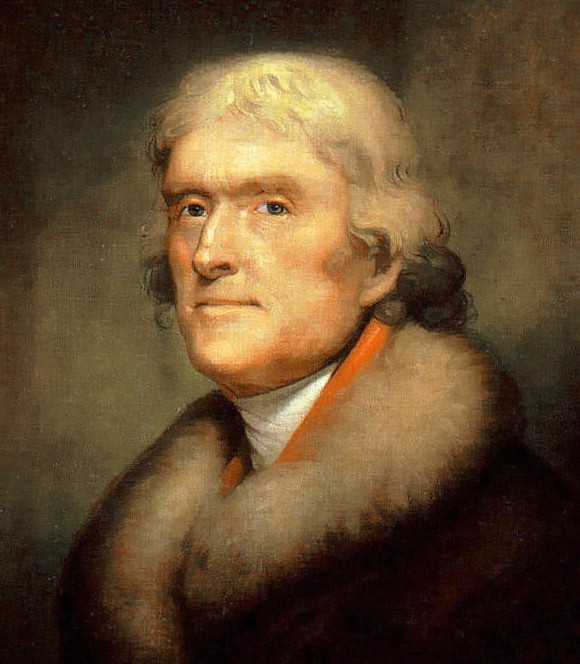Who is the real Thomas Jefferson?
Historians have attempted to answer this question since “Sage of Monticello” died in 1826.
Jefferson has been the symbol of nearly every political movement in America, even if he would have disagreed with their positions.
He has been described as a radical, a progressive, a liberal, an agrarian, a populist, a libertarian, a conservative, a republican, and a federalist.
Jefferson was first and foremost a Virginian. Modern attempts to attach ideological labels to the man often fail because the real Jefferson was rooted to a time and place, his State.
Jefferson loved Paris. He admired the New England “ward republics.” He studied Greece and Rome, and spoke highly of the Anglo-Saxon traditions. But none of these contemporary or ancient examples compared to his native country of Virginia.
He traveled as a Virginian and spoke from his “little mountain” plantation in the heart of the Virginia wilderness.
As Clyde Wilson explains in his fantastic new book on Jefferson, “Jefferson begins and ends with Virginia.”
Jefferson the statesman cannot be understood without knowing Jefferson the Virginian.
He drafted the Declaration of Independence only after his fellow Virginians pressed the issue, and he preferred to be back in his country debating a new Constitution rather than stuffed in Philadelphia with delegates from the other States. He borrowed some of the lofty rhetoric in the Declaration from George Mason and insisted that he wasn’t stating any new ideas or principles but simply expressing the American mind.
Wilson explains that much of our misunderstanding of Jefferson is due to historians missing context. Jefferson politely appeared to agree with everyone in person while playfully bantering ideas in his letters. The real Jefferson can only be understood from his actions.
For example, he certainly wished for religious freedom thought action must be taken by individuals in their own States.
Federalism, not “democracy”, and more importantly political decentralization, formed the core of his political world.
He distrusted banks, but in particular banks organized, financed, and administered by men who were not sufficiently republican.
He supported education but not from the “dark Federalist mills” of the North.
When Americans needed an intellectual symbol, they often turned to Jefferson.
Abraham Lincoln attempted to sound more like Jefferson than Hamilton throughout his political career. So did the progressives of the modern era.
Their policies never matched the man they rhetorically idolized, but it shows how Jefferson’s American has outlived Hamilton’s, at least in how we view American politics, even if most who invoke his name do not understand the man.
Real Jeffersonians, not just those who attempted to sound like Jefferson, dominated American politics for the first eighty years of the federal republic, and some could be found well into the twentieth century, particularly in the South.
They have virtually disappeared today.
Which is why Wilson has performed such an important service for the American public. His concise collection of essays provides the answer to “who was Thomas Jefferson”?
Jefferson never considered himself to be an ideological sage and thought such notions were foolish.
But as Wilson writes, “…he was the Virginian statesman who saved the Constitution from the centralizing and rent-seeking agenda of the Federalists and preserved it as had been intended in its ratification.”
If nothing else, Jefferson should be admired for his determined efforts to save America from scheming innovators and dangerous centralizers.







Dear sir, thank you for this article. It draws several parallels between the time of Jefferson and today by way of mentioning the people who wanted to claim association with Jefferson ideals without knowing the man. All for political purposes. We sorely need a Jefferson for these times, except today Jefferson would be silenced by MSM, harassed by the IRS,FBI,and multiples of people who practice Lawfare.
Regards Hugh Mcdanel
Sir, you are sadly correct.
I’ll know soon enough what Clyde Wilson has to say about “who was Thomas Jefferson?” but this review, by itself, answers the question pretty well. I’ve tried to read a few books on Jefferson that attempted to sum up his extraordinary life from all perspectives and I can’t remember a thing about any of them. Then I gave myself the assignment of Dumas Malone’s six volumes, an experience I’ll never regret, and no matter the stage, place or time Jefferson always looked to return to Virginia, whether by carriage or correspondence. Whether it was longing for family and friends or the way of life it was all the same, he was at home with agrarianism, even before it was defined.
I look forward to descriptions of Jefferson “playfully bantering ideas in his letters”. He famously avoided confrontations but he was sneaky – and relentless in insisting on personal liberty.
Thanks for this summary. This is why I come here, for articles like this. When I followed the link to Amazon I also found out that Al Benson and Walter Kennedy have a new book out too!
I consider myself a Northerner because I’ve lived here in Rochester(Western,NY) all my life(61 yrs), but I don’t consider myself to be a Yankee. I think there is a difference.
As a “nutmegger” (i.e., from Connecticut), I share your sentiment. Unfortunately, here in the capital of the Confederacy, the progressives have seen fit to tear down our history, thus ruining a city I had grown to love and appreciate.